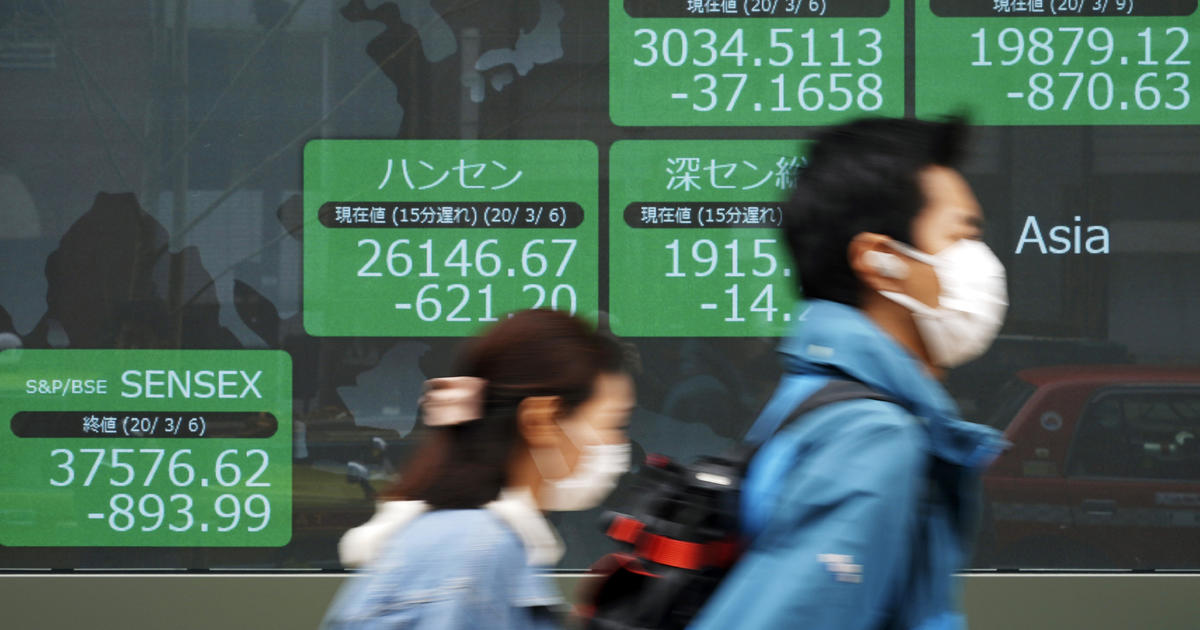
Asian stock markets plunged Monday after oil prices nosedived on worries a global economy weakened by the corona virus outbreak might be awash in too much crude. Wall Street futures prices were following suit.
Tokyo’s benchmark tumbled 5.5%, while Sydney fell 7.3%. Seoul sank 4% and Hong Kong lost 3.6%. Shares also sank in Middle East trading on Sunday. Futures prices for Dow Jones Industrial Average stocks were down more than 1,200 points as of 2:15 a.m. EDT.
Oil markets were roiled by a dispute among Saudi Arabia, Russia and other producers over how much to cut output to prop up prices.
Trending News ›
Benchmark U.S. crude fell 32%, or $13.23, to $28.05 per barrel in electronic trading on the New York Mercantile Exchange. Brent crude, the international standard, lost 30%, or $13.44, to $33.83 per barrel in London.
Investors usually welcome lower energy costs for industries and consumers, but in the current atmosphere of anxiety, they were rattled by the abrupt plunge.
“Now that oil spark that really started the selling this morning, it wouldn’t in normal times be as big a deal but coming in as it does at this stage of the market cycle, it sparked real fear among investors and we are seeing wholesale panic across the market today,” said Michael McCarthy of CMC Markets.
Markets already were troubled by the potential impact of the virus outbreak that began in China and has disrupted travel and trade.
Anxiety rose after Italy announced it was isolating cities and towns with some 16 million people – or more than one quarter of its population.
The number of infections from the virus that causes COVID-19 has topped 100,000 worldwide.
Companies have been hit by sweeping anti-disease measures. Apple says slowdowns in manufacturing iPhones in China will hurt its sales totals. An airline industry group says carriers could lose as much as $113 billion in potential ticket sales. Cruise lines were being hit hard.
Adding to pessimism, China reported Saturday that its exports fell 17% and imports were off 4% from a year earlier in January and February after Beijing shut factories, offices and shops in the most severe anti-disease measures ever imposed.
Central banks worldwide have cut interest rates. But economists warn that while that might help to encourage consumer and corporate spending, it cannot reopen factories that are shut due to quarantines or a lack of workers and raw materials.
Investors are looking ahead to a meeting Thursday of the European Central Bank, which is widely expected to announce new stimulus measures.
Chinese factories that make the world’s smartphones, toys and other consumer goods are gradually reopening but aren’t expected to return to normal production until at least April. That weighs on demand for imports of components and raw materials from China’s Asian neighbors.
Already last week, global stocks were sinking as the spread of the coronavirus prompted governments to follow China’s lead by imposing travel controls and canceling public events.
The U.S. Federal Reserve’s emergency 0.5% cut in its key lending rate failed to reverse the downturn.
The yield on the 10-year Treasury, already at record lows, has dropped to 0.51% from 0.7% late Friday.
The yield – the difference between a bond’s market price and what investors will receive if they hold it to maturity – is an indicator of the market’s outlook on the economy. Rising market prices that cause the yield to narrow indicate investors are shifting money into bonds as a safe haven.
“Global recession risks have risen,” said Moody’s Investors Service in a report. “A sustained pullback in consumption, coupled with extended closures of businesses, would hurt earnings, drive layoffs and weigh on sentiment.”
On Wall Street, the benchmark S&P 500 fell 1.7% on Friday. The Dow Jones Industrial Average lost 1% and the Nasdaq composite, which has a large share of technology companies, fell 1.9%.

